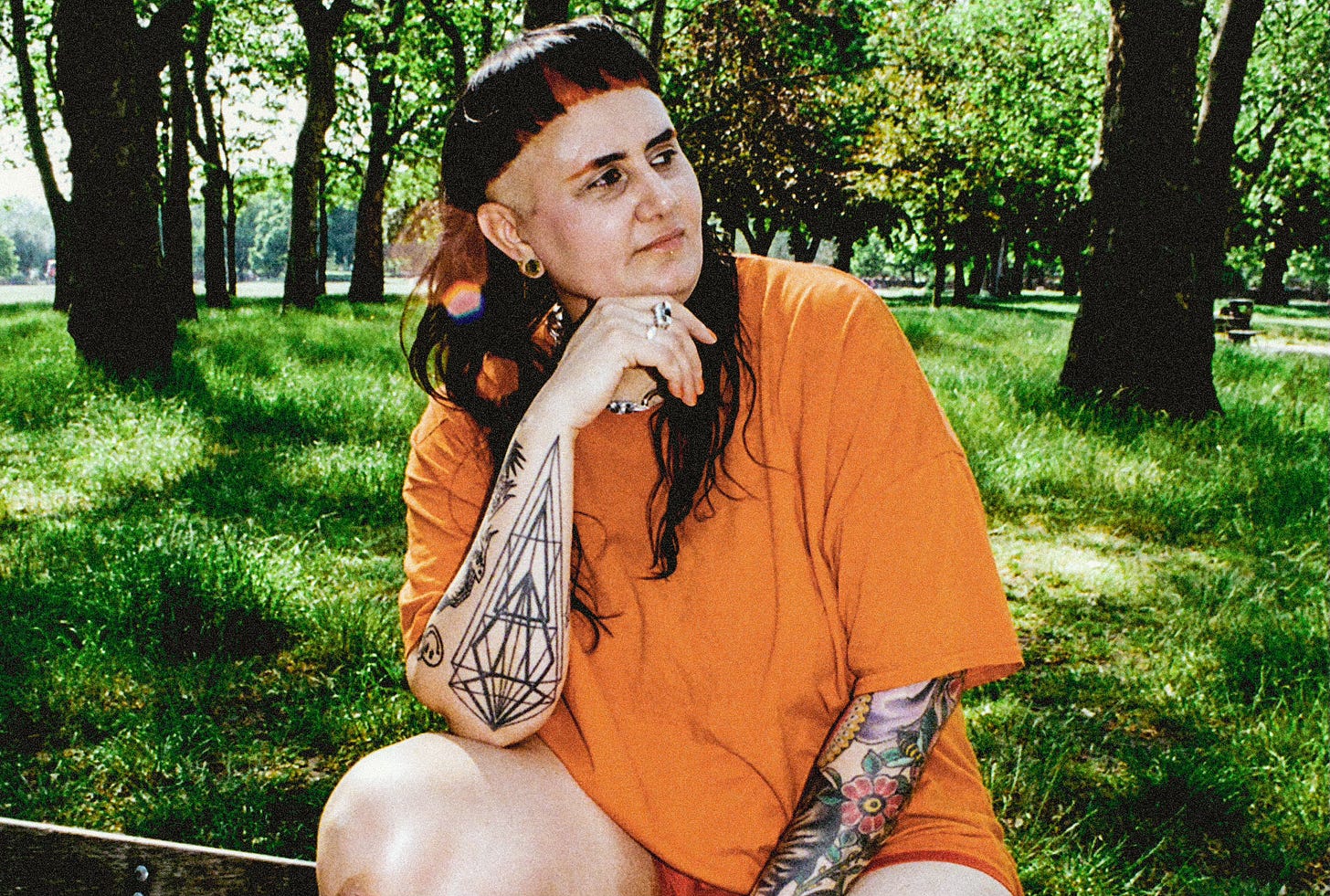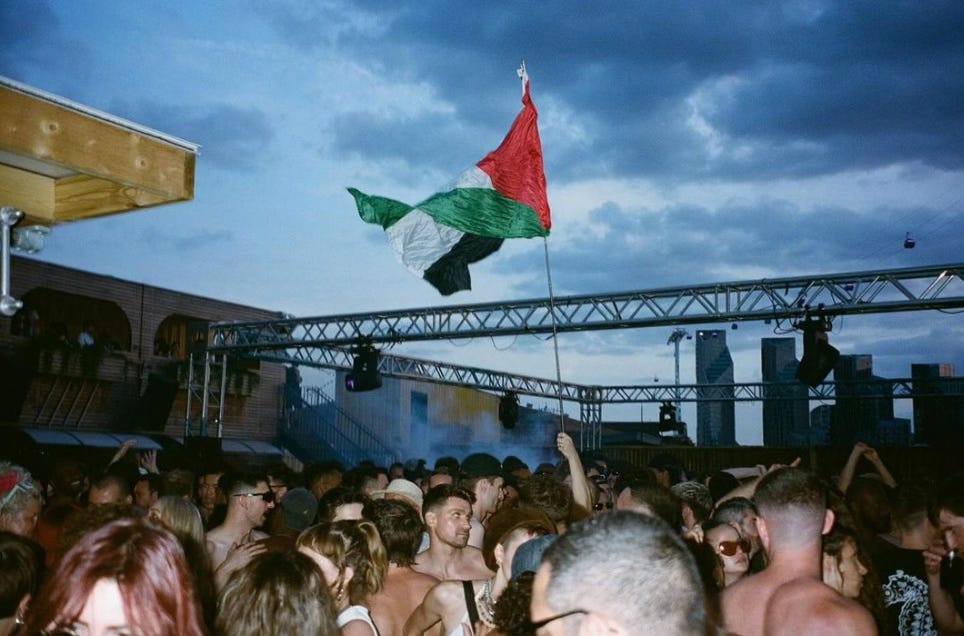#20 Deeper Into Outer Space | Michelle Manetti
“In the world we live in now, which feels like it's totally collapsing, we need nightclubs more than ever…”
DJ, producer and vocalist Michelle Manetti is a pillar of London’s queer club community.
For more than 20 years, she’s been steeped in the capital’s nightlife as Fèmmme Fraîche promoter at LGBTQIA+ mothership Dalston Superstore and resident DJ at Adonis. In the current club climate, when the going gets tough, the tough get the poppers out - at least I do. But in an environment that seems to be increasingly unhinged, for many of us, nightlife is an essential societal oil.
“London’s landscape is constantly changing which means clubs do come and go,” Michelle states. “But in a time when there’s so much conflict, anger, when money is tighter than ever and the authorities seem to be clamping down on us, we need clubs and the sense of community they bring to survive.”
Even though many clubs have closed - with more than half of London's LGBTQ+ venues closed between 2006 and 2022 - Michelle has an inherent optimism about nightlife’s potential for rebirth and rejuvenation born out of living through many of its ups and downs.
“Whenever I see somewhere shut, there’s always something new that comes in its place,” she says. “Colour Factory has become well-known as queer-friendly as has the Yard. We know these venues work as queer spaces, despite not being dedicated queer clubs.”
“We will always need somewhere to gather, to escape from what is going on around us - and that is often found on the dancefloor,” Michelle continues. “The more the world goes to shit, the more we need it.”
Early dance music skirmishes
Michelle grew up in Croydon, then moved to Horsham with her first forays into electronic music spent between the two. Kiss FM, and a love for funky house and hard house in Brighton all became mixed up in a burgeoning musical passion.
“Sometimes when my dad was working nights, me, my sister and her mates would have ‘sleepovers’ where he’d go to work and we’d go clubbing underage,” Michelle remembers. “So places like the Ministry of Sound, the Blue Orchid in Croydon, and the Hanover Grand.”
“It was the first time for me experiencing the queer scene,” she adds. “Not necessarily queer clubs, but a lot of the clubs we went to were known as 'Glam Clubs', these venues would have a dress-up policy, a drag queen on the door and play handbag house music. It felt like a really fun new world that I had discovered.”
Her first experience of DJing initially came via an after party and just taking a turn on the decks. She later went on to do session work as a vocalist, during which time she decided she'd like to be able to make her own music, so Michelle began to find her way around a studio, studied music production and her journey escalated from there. For her, the flames surrounding DJing forays were fanned by boys attempting to act as gatekeepers around it.
“I remember really liking the idea of DJing but being told it was a boy thing,” she says. “Whenever I was told that, I would go above and beyond to push against it.
“I would always question why I wasn’t allowed to do the same things as boys, just because I’m a girl? It just hardened my resolve and pushed me to find out more about electronic music and DJing.”
Fèmmme Fraîche
An early breakthrough moment for Michelle was being spotted to work for a queer nightclub called Salvation, then being flown to South East Asia on a mini-tour. Since then, she has worked tirelessly DJing at parties and clubs - Candy Bar, OPP, Wish, Mannequin, Mint, Club Lesley, Twat Boutique, Goldsnap, and Dick & Fanny among them.
Fèmmme Fraîche is a FLINTA (Female, Lesbain, Intersex, Trans and Agender / Asexual) focused party that was launched by Michelle and co-conspirator Sandra Le. Run at Dalston Superstore, Michelle remembers their first-year anniversary bash with Honey Dijon as a huge moment for her.
“Honey DJed, just after that Sugar Mountain set and Superstore’s Dan Beaumont pulled a lot of strings to help us put that particular party together,” she says. “It was absolutely rammed, we had queues around the street by 11.30pm. I did the warm up and it put both me and the night on the map.”
“There weren’t that many queer females DJing at the time playing that kind of music so I had a unique USP. Now there are many more of us which is amazing - it shows you how far the scene has come in the last seven or eight years.”
Dalston Superstore has long been the home for Fèmmme Fraîche, a venue that recently celebrated its 15th anniversary. When Michelle welcomes guest DJs from outside the UK, many remark on how amazing it is to play in a space like it - something she feels is taken for granted by many in London.
“Similar spaces - a full-time, authentically queer space that is programmed in a way that is really diverse and well-considered - just don’t exist everywhere,” she says.
“The community around it is so important - they have a regular trans night every Wednesday [called Body Swap], a night dedicated to neurodivergent queers [Spectrum] there are so many elements. If you want to find your niche, you can find it there and I’m so grateful to be part of it.”
Fèmmme Fraîche was born out of Dick and Fanny, a night run by Michelle’s previous business partner Sandra Le. Sandra was one half of the team behind Dick and Fanny alongside her then flatmate Alex Karotsch. The pair - a gay man and a lesbian - usually had to have pre-drinks at theirs, then go on to separate clubs. Their night was a way to party together and Michelle was a regular DJ for them before being told to run her own night.
“I owe a lot to Superstore for helping keep Fèmmme Fraîche going,” she says. “They will do things to maintain the party as they understand its importance. Some years back, for a time, our night wasn't hitting the bar spend as much as some of the other parties, but our FLINTA audience behaves differently and the Superstore team have always been understanding and supportive of that.”
“We love it at Superstore, it works so well across the two floors, the underground dance music downstairs, then the more poppy sing-along vibes upstairs. It’s a unique and perfect setting for us.”
Gentrification
If you go down to Dalston today, Kingsland Road has certainly evolved from the mid-2000s. Dalston Superstore was one of the first venues to open back in 2009 at a time when I had just moved to London. Back then, there were parties like Batty Bass and Trailer Trash popping off in Shoreditch with Dalston feeling like some sort of out-there wilderness. Fast forward 15 years and Kingsland boasts (?) an M&S and a Pret. Shoreditch is equally unrecognisable with all those exciting, trashy edges smoothed off.
“Gentrification is obviously a huge thing,” says Michelle. “There were all these amazing electroclash parties, then when the queer nights and underground electronic parties moved up Kingsland Road to Dalston, there were so many basement clubs you could go to. Now it’s really hard to do anything due to the council’s tight licensing regulations.”
Making the financials work is part of the challenge for venues and promoters. With rents rising, energy bills increasing, and the cost of everything else spiralling, inflation has had a serious impact on the pockets of punters - but promoters can’t add too much to ticket costs without running the risk of pricing people out.
“It’s become an uphill struggle and lockdown also fucked everything too,” she explains. “There was a period when Tottenham Hale was the new Dalston with new venues - Five Miles and the Cause - but they’ve now all gone due to regeneration. It’s just changing all the time.”
Community = club magic
When we speak, Michelle has just finished a weekend at Glastonbury and DJing at NYC Downlow. Many cite it as one of the best clubs in the world while Michelle is also resident at Adonis, one of London’s most important queer parties. What is the secret sauce that makes these parties so special? For Michelle, it’s the emphasis on community.
“There aren’t that many places that have this magic,” she says.
“In the Downlow, we are this big queer family who look after each other, it translates to the DJs, and the crowd who are in there - that’s what makes some of these spaces so special.”
Michelle mentions that one of the first Adonis parties held at the now gone Five Miles in Tottenham Hale. A handful of curious punters were listening to resident Josh Caffe play - it’s gone from this to a multi-room mega rave.
“Adonis is now an absolute beast of a party - super hedonistic, dirty, hot, a nasty sweat pit in the best possible way,” she laughs. “The upstairs room is dripping and you haven’t really gone clubbing unless you’ve come back home drenched in sweat.”
The link between the spaces, clubs and nights Michelle has played at over the years and continues to DJ at is the emphasis on the connections formed between those in the room. It’s something that cannot be undervalued, particularly during challenging times.
“Adonis just goes to show how something can evolve and grow, it shows that you should never give up, you have to start somewhere,” says Michelle. “You can feel the difference between a party made for love and a party made for money. That’s why these nights and these parties are so important.”
Visit michellemanetti.com to find out more. Check her site and Instagram for upcoming dates.
For more on club and rave culture, you can order a copy of my book, ‘Out of Space: How UK Cities Shaped Rave Culture’ via the Velocity Press website now.






